The Collector's Daughter Read online
Page 20
Eve swallowed. “I couldn’t face going back there after Pups died. Egypt would always have reminded me of him dying.”
It wasn’t just that, she thought. She had loved Egypt so passionately—the baking heat, the vibrant colors, the culture, the sheer foreignness—then that love had turned to horror almost overnight. Suddenly she associated it with danger: the crocodiles floating in the Nile, looking like logs of wood; the cobras that hid in trees, camouflaged against the bark; the whining mosquitoes and strange flying insects that transmitted disease and infection; and the militant nationalists shooting people in the street.
“When I married Brograve, I decided to start a new chapter, being a wife and mother instead of a lady archaeologist.”
“That’s a shame,” Ana said. “There are so few women in our profession, even now. You could have been a trailblazer.”
“I would have loved Patricia to take up archaeology, but she had different interests. You can’t force it, can you? They either take to something or they don’t. Do you have a daughter who could follow in your footsteps one day?”
There was a long pause and Eve thought Ana’s voice sounded shaky when she replied. “I don’t think my daughter, Layla, is interested in archaeology.”
There was something odd about the way she said it. Why didn’t she know her own daughter’s interests? Was it because they’d been separated for so long? “What age is she?” Eve asked. “Maybe she will grow into it.”
“Layla is eleven and my son, Masud, is eight.”
“You’re lucky to have two,” Eve said. “I would have loved a son. You must miss them terribly.”
“Do you think she knows?” said a voice that was neither Ana’s nor Eve’s. It was a crossed line. They often got crossed lines in that apartment block. It unsettled Eve to think that their neighbors might be listening in anytime she was on the phone.
“Hello?” she called into the ether. “If you can hear me, please hang up.” There was no reply and the muffled conversation continued, barely audible. “How annoying! I suppose we’d better say goodbye,” she said to Ana. “But I’ll call you again soon.”
“Before you go, did you remember where the gold unguent container is?” Ana asked.
Her tone sounded as if she knew that Eve had it, and Eve tried to remember if she had admitted that. She didn’t think she had.
“I honestly don’t know,” Eve replied, frustrated with herself. “The truth is that I can’t remember.”
“It was taken out of the tomb, wasn’t it?” Ana persevered. “When did you see it last?”
“If I knew that, I’d know where it was.” It upset her that she couldn’t find it. It was starting to scare her.
Sionead glanced out into the hall and gave her a concerned look. “You OK?” she whispered.
“I’m fine,” Eve said, but she had that funny headache again, like a finger pressing the back of her skull. “Perhaps you could fetch me a paracetamol? Sorry, Ana, I have to go. Goodbye.”
She placed the receiver on the hall table and rested her head in her hands, completely forgetting that Ana was still on the line. It was only half an hour later, when Brograve got home, that he noticed the whining noise and put it back on the hook.
* * *
Sionead’s contract had been for three months and the time was drawing to a close. During Eve’s afternoon nap, she asked Brograve whether he was ready to manage without her. There was another job her agency could put her forward for, now that Eve didn’t need help with personal care. A plumber had come to replace the bath with a walk-in shower so she didn’t need help washing herself anymore. She hadn’t had a choking incident since before Christmas, and the TIA in January had been very mild, so Sionead’s role lay largely in dispensing pills and checking blood pressure.
“You don’t need me,” she said. “Not really.”
Brograve felt tightness in his chest. What if something happened that he couldn’t cope with?
Sionead sensed his uneasiness. “Before I go, I could teach you some techniques to use if the need arises. We can practice together. I’m not going to leave you in the lurch. It’s just that there are other households where I could be of more use.”
“What kind of techniques?” His voice was hoarse, so he cleared his throat.
“You already know what to do in the event of choking,” she said. “I could show you what to do if Eve has a funny turn. Explain when you might need an ambulance, and when you just need a doctor.”
“I’ll talk to Eve about it,” he said, but he already knew her views: she didn’t think she needed Sionead and felt he shouldn’t be wasting all that money. It was expensive. “But I’d be grateful if you could explain the techniques.”
She began with the worst-case scenario—what to do if he found Eve unconscious and not breathing. She demonstrated how to attempt resuscitation while waiting for an ambulance, and he practiced on a long cylindrical sofa cushion. A tear slid from the corner of his eye as he imagined having to do this in real life, and he turned his head so Sionead wouldn’t see.
Next she showed him the recovery position, to be used if Eve was unconscious but still breathing. And finally she explained some tests to perform if Eve was conscious but seemed muddled, or had slurred speech or a drooping face. Brograve was so choked up he could barely speak.
“I could write everything down for you,” Sionead offered, “and leave the list by the phone.”
He nodded and mumbled, “Yes, please do that.”
“You’ve saved her life before,” she told him. “The last stroke would have been much worse if you hadn’t gotten her to hospital so quickly.”
He knew time was of the essence. He hadn’t told Eve in so many words, but that was why they had to leave Framfield. After an incident in 1971, it took over an hour for the ambulance to find them, then another hour to reach St. George’s. That time it was just a TIA, but if it had been a stroke, the damage didn’t bear thinking about.
As soon as Sionead left the room more tears came to his eyes. What if he were the only person there when Eve collapsed and his actions made all the difference between her living or dying, but he failed her? How would he live with himself? It would be like the guilt he’d felt about his friend Oliver, but multiplied many times over.
All elderly couples must live with this fear, he rationalized. Sionead had given him some control over the situation. He would keep the list handy, and if the time came, he would do the very best he could.
Chapter Thirty-Seven
London, March 1973
Eve and Brograve met Maude and Cuthbert for afternoon tea in the Savoy Hotel River Room. It was nice to have a reason to dress up, Eve thought. Even when they were spending the day at home, she wore a smart skirt and blouse, and chose a necklace to match. She had never taken to trousers; they made her look like one of the seven dwarfs.
It was a sparkling spring day—warm in the sun and chilly in the shade—and she had put on an ice-blue flowered dress, fitted around the bodice, swishy at the hem, a tea dress they used to call them. Her favorite pearls were clasped around her neck and she tottered into the River Room on blue leather Mary Janes, leaning on her tripod stick. She couldn’t wear high heels for now while she was still getting her balance back.
“Don’t you look lovely!” Maude said, embracing her. “I’m still in my winter woollies because I feel the cold now I’m an old biddy.”
They ordered the full afternoon tea: finger sandwiches, slices of cake, scones with cream and jam, homemade shortbread. They’d never eat it all, but it looked storybook pretty in its tiered cake stand.
“We had our golden wedding anniversary party here,” Cuthbert said, and Maude nudged him with a quick frown.
“Golden! That’s fifty years!” Eve exclaimed. “Has it really been that long?”
“I’m sorry,” Maude said. “It was last September, while you were in the hospital. I wasn’t going to mention it because I didn’t want you to feel you missed out. Yours is
coming up later this year, isn’t it?”
“Is it?” Eve looked at Brograve. “When’s our anniversary?”
“The eighth of October,” he said.
“It’s usually women who remember dates,” Eve said, “but Brograve is our keeper of memories now. I suppose we should celebrate our fiftieth, but we got married during one of the lowest points of my life, so anniversaries have always felt rather bittersweet.”
“Fifty years is an achievement!” Maude said. “You should have a party. We could get the old gang together, see who’s still around.”
Eve wasn’t sure about that. Parties were difficult for her now that she had a rotten memory. She hated to hurt people’s feelings by forgetting who they were. Maybe she could ask Brograve to stand at her elbow and whisper names, the way the Queen’s lady-in-waiting did for Her Majesty.
“You always threw the best parties,” Cuthbert said. “I loved those ones on the terrace at the House of Commons, or in the owners’ bar at Newmarket, or your picnics at Glyndebourne. You’re a consummate hostess.”
Eve stared blankly. She didn’t remember any of those occasions. Not a single one.
“Perhaps it would be too much pressure to host a party this year,” Brograve said, seeming to sense her bewilderment. “Maybe I should take you to Paris instead. We could have a second honeymoon.”
She beamed at him. “That would be lovely,” she said, then turned to Maude and Cuthbert. “Now, I want to hear all about this party you secretly held behind my back. How many guests? What did you serve? Was there music and dancing? Spill the beans so I can at least imagine I was there.”
* * *
Eve had been in no mood for a wedding in 1923, the year Pups died, but she felt she owed it to Brograve. They had waited long enough to be man and wife. Their engagement was announced in The Times on the seventeenth of July, and Almina took Eve to Paris for their long-delayed trip to choose a wedding dress, both of them garbed head to toe in black mourning clothes.
They settled on a beautiful drop-waisted gown of ivory chanteuse and a full-length veil of old Brussels lace. Eve couldn’t raise any enthusiasm for the process. Her limbs felt heavy. Everything was difficult: making conversation, eating, getting dressed in the morning—it all took Olympian effort.
Almina was in better spirits than she had been at Highclere, almost her old self again. She’d decided she wanted to be addressed as Almina, Countess of Carnarvon, and had placed an announcement on The Times court page to that effect. Having her identity clarified seemed to boost her confidence. She chatted to the women at the fashion houses, and with their help selected dozens of new outfits for Eve’s honeymoon, charging them all to her personal account.
Back in London, Maude, Emily, and Lois, the unholy quadrumvirate, rallied around. They would be her matrons of honor and would make sure the day went smoothly, looking after the flowers, the decoration of the church, the guest list. All she had to do was turn up and repeat her vows.
“We’ll even help you with that if you like,” Maude joked.
Most of the summer Almina was preoccupied with work at the hospital, which was now located in Portland Place. It was the hospital of choice for her aristocratic friends, and all the beds were full. Among the patients was Pups’s half brother Aubrey, who had long suffered from ill health and very poor eyesight. On top of that, a dental operation had gone wrong, causing blood poisoning. When Eve visited him she found he was very poorly indeed, drifting in and out of fevered consciousness. It took her viscerally back to the hotel room in Cairo where Pups had died five months earlier, and she was in floods of tears as she left. Aubrey was only forty-three and he had four children, the youngest just a year old; how could life be so cruel?
Uncle Mervyn arrived from Cairo on the twenty-sixth of September—the day before his brother Aubrey died, and just twelve days before Eve’s wedding was due to take place.
“We have to postpone the wedding,” Eve said, at a family wake in Seamore Place. “As a mark of respect, if nothing else. Many of the guests will be in mourning. We’re still in mourning.”
“Nonsense! It has to go ahead,” Almina insisted. “We can’t change the arrangements a second time or the rector will give up on us.”
“It’s supposed to be the happiest day of my life but I feel so sad,” Eve said. “I don’t want my wedding day to be a day of mourning.”
Brograve was consulted but he said he would do whatever Eve wanted. Eve knew his parents were keen for the wedding to proceed—Betty had more than once dropped hints about the patter of tiny feet, and expressed a wish that if the baby were a boy he be named Edward, after Brograve’s brother.
Uncle Mervyn urged her to marry as planned. “There is great comfort to be had in marriage and I want that for you,” he said. “Into the darkest time of your life, Brograve will bring light.”
But still it felt wrong.
“Couldn’t we just have a slight delay, till December perhaps?” Eve asked Almina. “I like winter weddings, with snow and fur muffs.”
“December’s out of the question,” Almina said immediately. Her tone was so adamant that Eve was puzzled.
“What difference does it make?” she asked. “I don’t understand.”
“I have other plans in December,” Almina said but wouldn’t explain what they were. “Later,” she said, glancing sideways at Mervyn.
When Eve went to her mother’s room at bedtime, Almina blurted out the truth: “I’m getting married to Ian Dennistoun in December, and I don’t want our weddings to clash.”
“Ian Dennistoun?” Eve stared in disbelief. “Your friend Dorothy’s ex-husband?”
Her mother nodded, biting her lip to restrain a smile that was twitching the corners of her mouth.
“But . . .” Eve was flabbergasted. Ian was a charmless middle-aged man with a paunch who had neither money nor profession. He had become a member of her mother’s social circle lately, but marriage? How could she? “December will only be eight months since Pups died. It would be an insult to his memory.”
“Oh, Eve, you’re so sentimental.” Almina turned to her mirror and began to smear cold cream on her neck. “I have as much right to be happy as you do. I love Ian and he loves me. We’ll keep the wedding low-key, I promise.”
“Couldn’t you at least mourn Pups for a year? Is that too much to ask?” The haste felt indecent.
“You’re so young, Eve. I can’t explain it to you but I need this, and I deserve it, so it’s happening in December and that’s that.”
Eve couldn’t think how to reply. She ran from the room and rushed downstairs to tell Brograve.
“What is wrong with my family?” she cried. It felt as if everything was falling apart now that Pups had gone, like a book without any binding. “Porchy and Mama are at loggerheads, and she says she is marrying Ian Dennistoun. Ian, of all people!” She was too shocked and irate to cry. “Porchy will be incandescent when he hears. The press will have a field day . . .” She remembered Arthur Weigall hinting about it earlier in the year, and she hadn’t believed him.
“Families are tricky constructs,” Brograve said. “It’s not the first time we’ve had this conversation. We can’t change what the others do, but we can make decisions for ourselves. And I propose that you and I get married on the eighth of October as planned, then I will be your family. Let the rest of them do as they wish.”
Eve sat in his lap and rested her head on his shoulder. In that position they were an exact fit. He was the only person she felt safe around now that Pups was gone. When she was in his arms, breathing the scent of him, she felt protected and wholly loved.
“You’re right. I’ve waited four years to become Evelyn Beauchamp and there’s no point waiting a moment longer.”
To herself, she thought, Best get it done before anything else can go wrong.
Chapter Thirty-Eight
London, October 1923
Sun streamed through the ancient stained-glass windows above the altar as Eve
walked down the aisle on Porchy’s arm. He was kind to her that day when he stepped into his father’s shoes to give her away. St. Margaret’s was an elegant church with pretty stone arches running along either side of the pews. She was aware of the whispers and giggles of the little flower girls behind, who looked like Botticelli cherubs. She imagined Pups’s spirit was there, floating somewhere in the atmosphere, wishing her well. If it were at all possible, she knew he wouldn’t miss his daughter’s wedding day.
Brograve looked taller and lankier than ever as he stood at the altar, and she smiled. Although she was wearing the most vertiginous high heels she could find, their height difference made them look as if they were different species—like a giraffe marrying a deer. She grinned at Maude, Emily, and Lois, all dressed in matching mauve satin gowns and looking beautiful, each in their own way.
When she reached the front of the church, Brograve took her hand and held it throughout the ceremony, as if to anchor her. All the same, tears came when the minister pronounced them man and wife. Pups would have been so proud. She could hear Almina sniffling in the front row—only the second time Eve had ever heard her mother cry.
Next it was time for photographs: group ones, family ones, individual ones; the photographer herded them around till he had all the pictures he wanted. They had decided not to hang around for a party but to catch a boat train to Paris that evening. Eve changed into a cream linen traveling outfit, knocked back a glass of champagne, and tossed her orange blossom bouquet over her shoulder. It was caught by a young cousin of Brograve’s, who looked a little unnerved.
Then at last they were alone together in a private carriage, legally wedded man and wife.
* * *
Brograve had arranged for some Bollinger and a light supper to be served in the train carriage, which had a table, armchairs, and a fold-down bed in the corner by the window. They sat and picked at the food, sipping champagne, and Eve felt nervous. Would he want to make love to her here, on the train, or would he wait till they reached Paris? Emily had told her what to expect, in some detail, and had warned her that it would hurt the first time but that the pain passed quickly, to be replaced by “indescribable” pleasure.

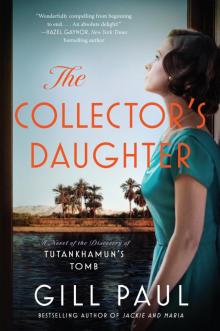 The Collector's Daughter
The Collector's Daughter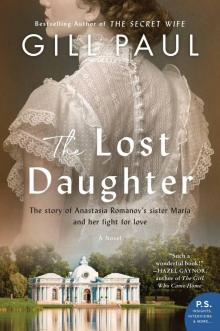 The Lost Daughter
The Lost Daughter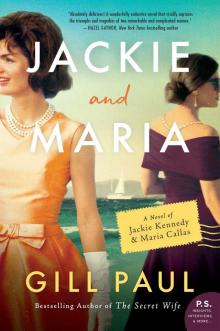 Jackie and Maria
Jackie and Maria The Affair
The Affair Love...Maybe
Love...Maybe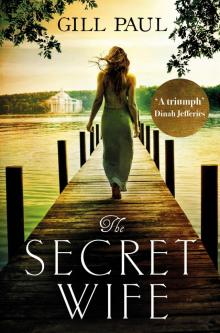 The Secret Wife
The Secret Wife No Place For a Lady
No Place For a Lady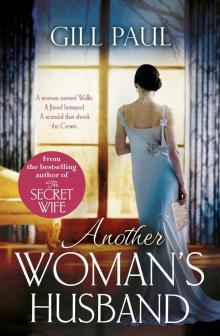 Another Woman’s Husband
Another Woman’s Husband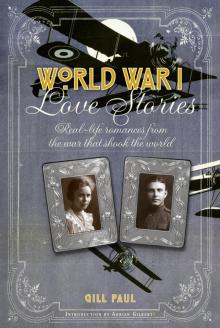 World War I Love Stories
World War I Love Stories World War II Love Stories
World War II Love Stories